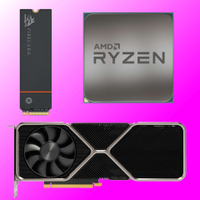Super exclusive graphics cards, motion capture suits, and glasses for digital nomads are all winners in the 2024 Computex Best Choice Awards
Given that AI was a big theme this year, there are surprisingly few AI-related items, which is a refreshing change.

Computex is an annual technology conference, where all the big vendors showcase new products, research, and forthcoming releases to the press and industry. Companies are invited to submit models or services for consideration in the Best Choice Award, a kind of 'yeah this is pretty neat' competition, and the 2024 winners are, perhaps unsurprisingly, mostly very expensive things.
You can see the full list of winners here (pdf warning) and it's quite a mixed bag of things that have been selected. There are two graphics cards, for example, the Asus ROG Matrix Platinum RTX 4090 and the MSI RTX 4090 Suprim Fuzion—both of which are water-cooled, though bizarrely the latter has the radiator built into the card itself.
No prices exist yet for the latter but the Asus card costs well over $3,000/£3,000 (more than double the MSRP of an RTX 4090).
Not everything is mega bucks, though, as some sensibly-priced laptops have won the award. I was pleased to see the Framework 16 get a nod, as not only is it an outstanding engineering feat (according to our Dave in his review), but it's also a genuine attempt at doing something different and forward-thinking in the laptop market.
If you're wondering what criteria the judges use to select the winners, you can watch this YouTube video to find out. I'm not entirely sure how a water-cooled, power-sucking graphics card "emphasises environmental protection, energy saving, and carbon reduction" but clearly the judges know more about these kinds of things than I do.
There are some odd winners, though. For example, the Asus ROG Ally handheld gaming PC was one, but so too was MSI's Claw. We've not got our own claws on the Claw just yet but our chums at Tom's Guide have and they were decidedly less than impressed with it. How that won is a bit of a puzzle.
My favourites, though, are the j-mex MOXI Smart Mo-Cap body suit, with one of the winning reasons being that "it's easy on the wallet and simple to install while maintaining precise data collection capabilities," and the Asus AirVision M1 which is apparently a "productivity tool designed for digital nomads."
The biggest gaming news, reviews and hardware deals
Keep up to date with the most important stories and the best deals, as picked by the PC Gamer team.
I have no idea what a digital nomad is but I strongly suspect that they'll be wearing a Moxi Smart suit at the same time as the AirVision M1, to be the ultimate…umm…tech person-thingy.
If I'm to be honest, I'm a bit perplexed by the whole award scheme. The vast majority of the products selected as winners as just normal tech items. I've been left wondering where is the real innovation, where is the true boundary-pushing tech, and why are so many of the products priced well out of most people's budgets?
I guess Nvidia's GH200 and Spectrum-X chips are suitable choices in terms of sheer technology, if one ignores their huge price tags, and the Framework 16 is a worthy choice, but a water-cooled PCIe 5.0 SSD? Surely not. Anyway, next year I might just submit a water-cooled mouse pad, as I reckon it could win hands-down.
Best CPU for gaming: Top chips from Intel and AMD.
Best gaming motherboard: The right boards.
Best graphics card: Your perfect pixel-pusher awaits.
Best SSD for gaming: Get into the game first.

Nick, gaming, and computers all first met in 1981, with the love affair starting on a Sinclair ZX81 in kit form and a book on ZX Basic. He ended up becoming a physics and IT teacher, but by the late 1990s decided it was time to cut his teeth writing for a long defunct UK tech site. He went on to do the same at Madonion, helping to write the help files for 3DMark and PCMark. After a short stint working at Beyond3D.com, Nick joined Futuremark (MadOnion rebranded) full-time, as editor-in-chief for its gaming and hardware section, YouGamers. After the site shutdown, he became an engineering and computing lecturer for many years, but missed the writing bug. Cue four years at TechSpot.com and over 100 long articles on anything and everything. He freely admits to being far too obsessed with GPUs and open world grindy RPGs, but who isn't these days?


